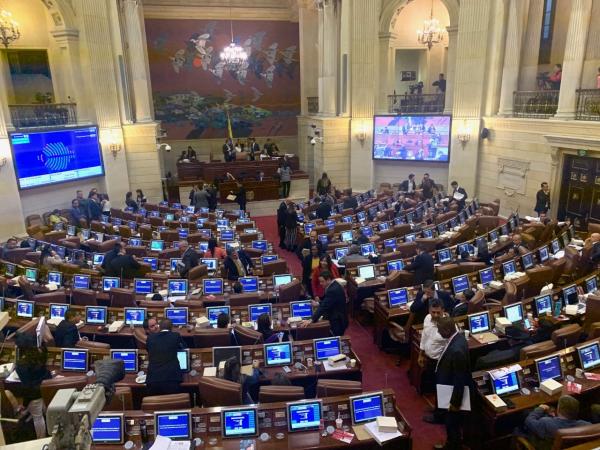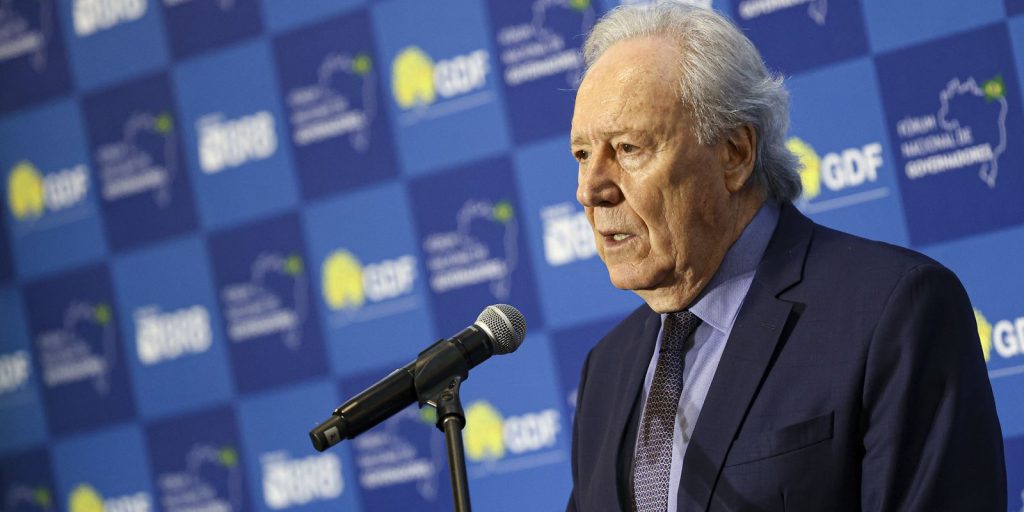The Ministry of Finance uncovered and is playing its last cards to obtain the money that it does not have within the 2025 spending projections, with the filing of the financing law that finally began its processing in the Congress of the Republic, amidst warnings of procedural defects.
With several changes in its articles that did not go down well at all in the joint economic commissions because they were not socialized in time and were not discussed during the Government meetings with the legislators, this project is being played between Wednesday and Friday of this week, its last chance to become law.
Other news: First Committees of Congress approved agrarian jurisdiction: what the initiative seeks
In its new text, this initiative eliminates the article that proposed a 19% VAT for luck and chance platforms, in response to the uncertainty that was generated in the market due to its impact. Likewise, a notable change is the carbon tax, which will be progressive.
The rate will start at $41,000 per ton in 2025, reaching $75,000 in 2027. However, for products such as Jet Fuel and For diesel, the rate will be partially applied at 75% between 2025 and 2027, and will be full from 2028.
Taxes.
iStock
For Henry Amorocho, professor of Public Finance at the Universidad del Rosario, this project maintains the short-term fiscal vision that has been promoted in the country for several years and that does not do any good for growth, given that it continues squeezing the middle class and productive capacity.
“I don’t see that they have reduced the burden on natural and legal persons And the truth is I don’t see a good atmosphere either on the part of Congress or on the part of the public for this project. I do not believe that the adjustments made are sufficient, because even the advance payment of the fiscal rule is still alive and that advance payment of the fiscal rule is lethal,” he highlighted.
Amorocho added that it cannot be overlooked that the country faces “difficulties that are demanding a greater budget cut and anticipating the fiscal rule is increasing public debt. This generates the idea in the rating agencies that there are risks to complying with the Government’s fiscal rule,” warning that there will be great opposition.
Also read: Prepare your pocket: Mayor of Bogotá confirmed that he will increase the TransMilenio rate
Fiscal management
On the other hand, José Ignacio López, president of Anif, asked to pay attention to the management that is being given to the country’s finances with this proposal, because in his concept spaces are being created of expenditure that in the future will be difficult to maintain with the proposed financing sources.
“An attempt is being made to finance a permanent expense with insufficient resources that would not cover those income needs that the General National Budget raises precisely. Now a new version is known, where the collection would be lower because one of the most important sources of collection that the draft presented was eliminated, which was, it went to online gambling and that requires socialization,” López explained.

Oil.
Bloomberg
Although the financing law as it stands maintains the tax threshold to the current assets and conditions for occasional profits, by eliminating the proposal to increase the rate from 15% to 20%, benefiting natural persons, its impact on the energy mining sector has oil companies on alert due to the unviability of the activity, due to the sharp increase in the rental surcharge due to exploitation due to high crude oil prices, which according to one of the changes in the presentation, increases the rate to a range between 7% and 20% depending on the average level of crude oil in he international market.
Today the current rate, after the first reform of the Petro government, is in a range that starts at 5% and ends at 15%.
Frank Pearl, president of the Colombian Oil and Gas Association, indicated the financing law would severely compromise the country’s energy and economic future, resorting to a mechanism that in the past led to exploratory investments falling by 57%.
“With the proposed tax increase, the end of exploratory activity in Colombia is in sight as of 2030, because additional increases in the surcharge would make exploration unfeasible. This increase also compromises the hydrocarbon production goals and would affect all fields, mainly those that produce heavy crude oil and to the marginal ones, which respectively represent 54% and 10% of the national total,” he indicated.
Portafolio learned that within Ecopetrol these impacts of the increase proposed by the Ministry of Finance have not yet been evaluated and industry sources explained that it is interpreted that through the increase in the rental surcharge due to high prices The Government is trying to recover the taxes not collected due to the non-deductibility of royalties of the income rate, which was declared unenforceable by the Constitutional Court.
More information: Sura EPS responds to the Supersalud decision on its progressive dismantling
Not needed
César Pabón, executive director of Economic Research at Corficolombiana, added that the current financing law proposal is unnecessary and inconvenient, since an adjustment of approximately $30 billion pesos to the 2025 budget would allow a new legislative discussion on this issue to be avoided.
“The great absentee, and it surprises us a lot, because it was perhaps the most correct version of the previous version, was to impose and include VAT taxes on online games, online games, gambling. At Corfi we have been very vocal, and in fact we have done several recent studies, of how this is one of the sectors that has grown the most in recent years, according to our figures, it has grown close to more than 50% a year in the last few years. last year,” he said.
Regarding the oil sector, he made it clear that “to continue increasing the tax burden of the companies that make it up, that since 2022 the effective tax rate of the mining and energy sector was far above the rest of the economy, we know that it is a scam to continue investing and growing in this sector, which in the end is our main creator or source of exports, of foreign currency.”

Games of chance.
This goes hand in hand with what was stated by Bruce Mac Master, president of Andi, who asked that “we be clear, the tax reform that is being presented is not to reduce taxes, it is to charge households and companies $11.5 billions of additional pesos in taxes. It is spending more resources from homes and entrepreneurs and companies to the national government so that the national government is the one that spends it.”
Finally, the Minister of Finance, Diego Guevara, also spoke out in the midst of the national debate and explained that some taxes were removed as unnecessary and that they were replaced by others that will have a lesser impact and will help in the collection task.
“We have taken out games of chance due to the different doubts of the speakers about the illegality scenarios that this type of tax can create, which is an issue that should be reviewed much more calmly, but we have introduced a 1% stamp tax. We have introduced dividends trying to complement the collection and now we will sit down to review everything with the speakers,” he said.
The law also prioritizes environmental and business incentives. The VAT for hybrid vehicles remains at 5%, promoting their adoption in line with the energy transition. In addition, a gradual reduction of the corporate income tax is introduced, from 35% to 30% by 2039, and to 27% for small and medium-sized companies, seeking to stimulate economic development.
Finally, the law includes amnesties for debtors of taxes and traffic fines. Offenders can reduce the total debt by 50% and the interest by 100%. For its part, the simple regime will be extended until 2026 before its definitive elimination, allowing a transition towards a more equitable and less disruptive system for the local economy.















